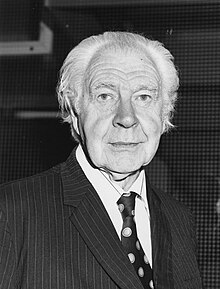Lionel Robbins
Lionel Charles Robbins, Baron Robbins (born November 22, 1898 in Sipson , Middlesex , † May 15, 1984 in London ) was a British economist and long-time head of the economics department of the London School of Economics .
Live and act
He is well known for his definition of economics as a behavioral science that examines the relationship between goals and scarce resources with alternative uses:
"Economics is a science which studies human behavior as a relationship between ends and scarce means which have alternative uses."
"Economics is a science that studies human behavior as a relationship between goals and scarce resources with alternative uses."
Robbins took part in World War I in the British artillery and taught at the LSE from 1925 to 1961. He was a supporter of William Stanley Jevons and Philip Wicksteed (1844-1927) and was also under the influence of Léon Walras , Vilfredo Pareto , Eugen von Böhm-Bawerk , Friedrich Hayek , Friedrich von Wieser and Knut Wicksell . Robbins became head of the LSE's economic department in 1929 and soon brought Friedrich August von Hayek to his institute. John Richard Hicks , Nicholas Kaldor , Abba Lerner and Tibor Scitovsky came from this school.
Robbins took part in the debate on socialist economic accounting on the side of Hayek and Ludwig von Mises , and against Abba Lerner , Fred Taylor , and Oskar Lange .
Robbins originally appeared as a staunch opponent of John Maynard Keynes and the Cambridge School of Economics - he initially saw the LSE as a downright bulwark against Keynesianism. In the end he accepted - unlike Hayek - the "Keynesian Revolution".
In his later years, Robbins turned to the history of economic dogma. He made great contributions to the British university system and was ennobled on June 16, 1959 to Life Peer with the title Baron Robbins , of Clare Market in the City of Westminster, and thus also a member of the House of Lords . Since 1942 he was a member of the British Academy . In 1955 he was elected to the American Philosophical Society and in 1966 to the American Academy of Arts and Sciences .
Publications (selection)
- Principles Of Economics , 1923, Economics.
- Dynamics of Capitalism , 1926, Economica.
- An Essay on the Nature and Significance of Economic Science , London 1932.
- The Great Depression , 1934.
- Interpersonal Comparisons of Utility: A Comment , 1938, EJ .
- The Economic Causes of War , 1939.
- The Economic Problem in Peace and War , 1947.
- The Theory of Economic Policy in English Classical Political Economy , 1952.
- Robert Torrens and the Evolution of Classical Economics , 1958.
- Politics and Economics , 1963.
- The University in the Modern World , 1966.
- The Theory of Economic Development in the History of Economic Thought , 1968.
- Jacob Viner: A tribute , 1970.
- The Evolution of Modern Economic Theory , 1970.
- Autobiography of an Economist , 1971.
- A History of Economic Thought: the LSE Lectures , edited by Warren J. Samuels and Steven G. Medema, 1998.
literature
- Henry Phelps Brown : Lionel Charles Robbins, 1898-1984 . In: Proceedings of the British Academy . tape 73 , 1987, pp. 601-630 ( thebritishacademy.ac.uk [PDF]).
Web links
- Biography on the LSE website ( Memento from December 18, 2005 in the Internet Archive )
Individual evidence
- ^ The Economic Problem in Peace and War - Some Reflections on Objectives and Mechanisms , Read Books, 2007, pp. 68 ("I owe much to Cambridge economists, particularly to Lord Keynes and Professor Robertson, for having awakened me from dogmatic slumbers"), 82-83.
- ^ Member History: Lionel Charles Robbins. American Philosophical Society, accessed December 22, 2018 .
| personal data | |
|---|---|
| SURNAME | Robbins, Lionel |
| ALTERNATIVE NAMES | Robbins, Lionel Charles, Baron Robbins (full name) |
| BRIEF DESCRIPTION | British economist and politician |
| DATE OF BIRTH | November 22, 1898 |
| PLACE OF BIRTH | Sipson , Middlesex |
| DATE OF DEATH | May 15, 1984 |
| Place of death | London |
